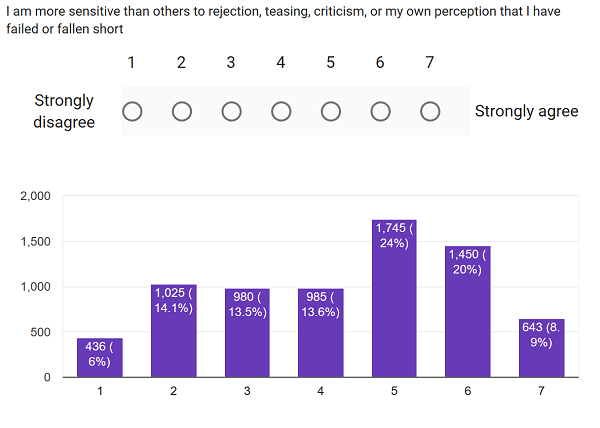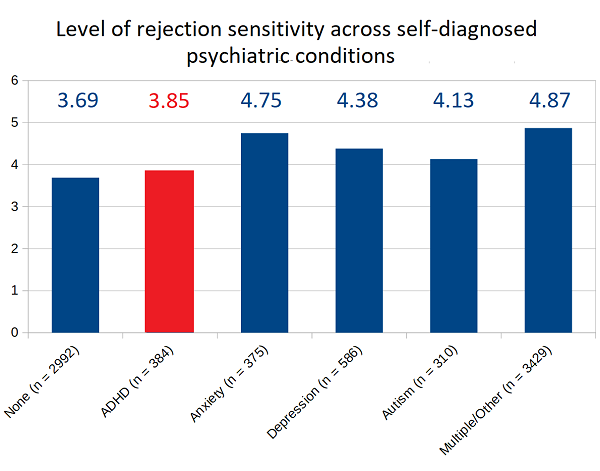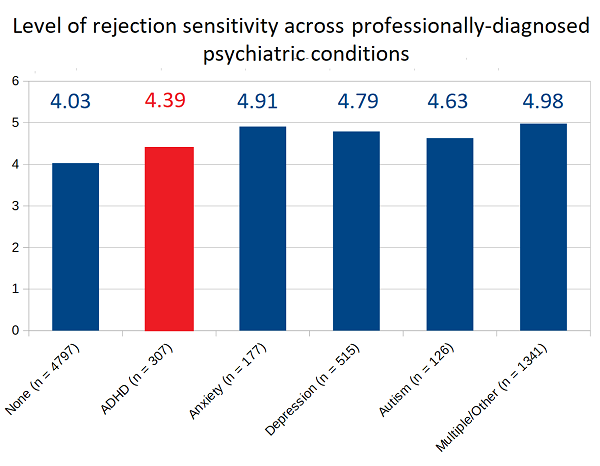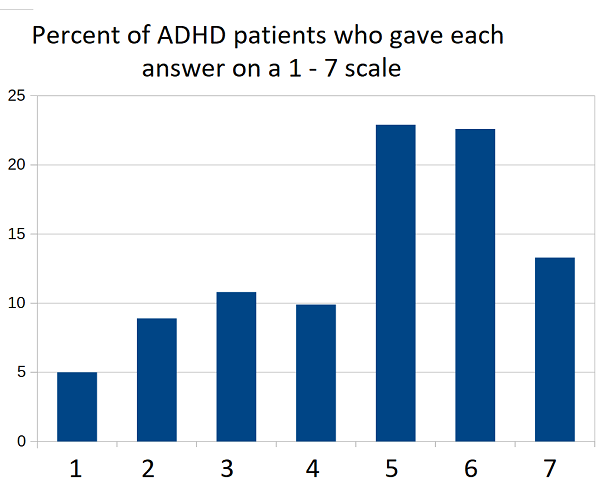Introduction
ADHD is typically considered a disorder of attention and focus. There are various other traits everyone knows are linked – officially, hyperactivity and “behavior problems”; unofficially, anger and thrill-seeking – but most people consider these to be some sort of effect of the general attention deficit.
Dr. William Dodson pushes a different conception, where one of the key features of ADHD is “rejection-sensitive dysphoria”, ie people with the condition are much less able to tolerate social rejection, and more likely to find it unbearable and organize their lives around avoiding it. He doesn’t deny the attention and focus symptoms; he just thinks that rejection sensitivity needs to be considered a key part of the disorder.
I say “Dr. William Dodson pushes”, but this requires a little research before it becomes apparent. What a Google search shows is just a bunch of articles saying that rejection sensitivity is a key part of ADHD that gets ignored by non-expert psychiatrists and that it’s important to educate patients about it and include it in any treatment plan. My conclusion is that all of these articles can be traced back to Dr. Dodson or people inspired by Dr. Dodson, of which there are many. The ADHD patient community has gotten really into this and pushed it in a lot of support groups and patient communities and so on, where it is repeated uncritically as “an important ADHD feature psychiatrists often forget about”. But the genesis is just Dr. Dodson saying so, with limited formal evidence.
See for example ADDitude Magazine, which says that:
Rejection sensitivity is part of ADHD. It’s neurologic and genetic. Early childhood trauma makes anything worse, but it does not cause RSD. Often, patients are comforted just to know there is a name for this feeling. It makes a difference knowing what it is, that they are not alone, and that almost 100% of people with ADHD experience rejection sensitivity. After hearing this diagnosis, they know it’s not their fault, that they are not damaged.
…and suggests very high doses of alpha-agonists or MAOIs (!) as a treatment. Or WebMD, which says:
Up to 99% of teens and adults with ADHD are more sensitive than usual to rejection. And nearly 1 in 3 say it’s the hardest part of living with ADHD.
Neither article cites any sources.
I am skeptical of the rejection-sensitive dysphoria concept. Part of it is the lack of evidence beyond Dr. Dodson’s personal experience, which my own personal experience contradicts. But part of it is that it seems suspicious for the Forer Effect, the tendency for everyone to believe a generic statement describes them especially. This effect is beloved of psychics – tell a client a few Forer statements and they’ll walk out convinced you can read minds – but it causes problems in the more reputable sciences as well. Here is Forer’s original list of statements that produce the effect:
1. You have a great need for other people to like and admire you.
2. You have a tendency to be critical of yourself.
3. You have a great deal of unused capacity which you have not turned to your advantage.
4. While you have some personality weaknesses, you are generally able to compensate for them.
5. Disciplined and self-controlled outside, you tend to be worrisome and insecure inside.
6. At times you have serious doubts as to whether you have made the right decision or done the right thing.
7. You prefer a certain amount of change and variety and become dissatisfied when hemmed in by restrictions and limitations.
8. You pride yourself as an independent thinker and do not accept others’ statements without satisfactory proof.
9. You have found it unwise to be too frank in revealing yourself to others.
10. At times you are extroverted, affable, sociable, while at other times you are introverted, wary, reserved.
11.Some of your aspirations tend to be pretty unrealistic.
12. Security is one of your major goals in life.
The first statement sounds a lot like rejection sensitivity. I will admit that one of the strongest pieces of evidence in favor of rejection-sensitivity dysphoria is all the ADHD patients who comment on any article about it with “Wow, this perfectly describes my experience! This is amazing!” – but if it were a Forer Effect, this would be less surprising.
There have been two studies attempting to investigate the ADHD-rejection link. The first, Canu & Carlson, failed to find it. The second, Bondu and Esser, did find it. This may be because the second had a larger sample size. But the second also correlated rejection-sensitive dysphoria with ADHD symptoms, rather than relying on an ADHD diagnosis. It also failed to screen out other psychiatric disorders, many of which are comorbid with ADHD and look a lot like rejection sensitivity (eg anxiety, depression). Overall this does provide some support for the hypothesis, but so far it looks like the only attempt to formally test it.
Methods
I investigated the idea of rejection-sensitive dysphoria through the Slate Star Codex survey, an online survey of readers of this blog. It received 8,077 responses, including 717 people with professionally-diagnosed ADHD, 860 more people with self-diagnosed ADHD, and several thousand with other psychiatric conditions.
The survey contained the following question:
I am more sensitive than others to rejection, teasing, criticism, or my own perception that I have failed or fallen short
This is a standard screen for rejection-sensitive dysphoria quoted as Dr. Dodson’s proposed addition to the DSM diagnostic criteria for ADHD (though I cannot find confirmation of this from Dr. Dodson himself). Most of the citations frame it more strongly, eg “For your entire life have you always been much more sensitive than other people you know to rejection, teasing, criticism, or your own perception that you have failed or fallen short?”. I cannot remember why I made the survey version weaker and this is a weakness of this study. Respondents were asked to rate their level of agreement with this statement on a scale from 1 (strongly disagree) to 7 (strongly agree).
The following analysis strategy was devised before looking at any data: to compare people with ADHD only to people with no psychiatric condition, to people with only one other psychiatric condition, and to people with multiple psychiatric conditions. The three other conditions with a large enough sample size to use were autism, anxiety, and depression. Analyses were done both among self-diagnosed patients and professionally diagnosed patients. I committed to publishing this post regardless of what the analysis said.
All other analyses were done after seeing the data, and should be considered exploratory only.
Results
7,264 people answered the question about rejection-sensitive dysphoria:

There was a slight bias towards affirmative answers, consistent with a small (but not large) Forer effect.
Among people with self-diagnosed psychiatric conditions, answers varied as follows:

ADHD had the lowest rate of rejection sensitivity among the four psychiatric conditions studied, although it was still higher than people with no condition.
Among people with professionally-diagnosed psychiatric conditions, the picture was much the same:

Once again, ADHD had the lowest rate of rejection sensitivity among the four psychiatric conditions studied, but was higher than people with no condition.
Articles alternately claim that “99%” “99.9%” or “almost 100%” of people with ADHD endorse rejection sensitive dysphoria. My survey found less dramatic results:

58.5% of ADHD patients gave answers of 5, 6, or 7 on a one-to-seven scale of rejection sensitivity. This was statistically significantly different from the 46.2% of the general population who did the same, but not in nearly as impressive a way as suggested by the 99.9% numbers that some people quote.
Discussion
My survey found that there was a weak but statistically significant tendency for people with ADHD to have higher rejection sensitivity than people without psychiatric conditions. However, this was a general tendency for any psychiatric disorder, and ADHD had the lowest rates of rejection sensitivity among the four disorders studied. This suggests the conception of rejection sensitivity as fundamental to ADHD is inaccurate and should not be included in discussions of the condition.
Flaws in this study include the survey methodology, which relied on self-report to get each respondent’s diagnosis or lack thereof. On a deeper level, if the current conception of ADHD is fundamentally flawed because of ignoring rejection-related symptoms, then no diagnosis using the current method can be trusted. But to call something ADHD at all, rather than a completely new illness, requires that it have some correlation with ADHD features as classically understood. Given that there is no generally-accepted objective measure of ADHD, these diagnoses are the best measurement we have at this time.
Other flaws included the admittedly weak single-question test for rejection sensitivity, the inexplicable softening of the single question from its classic version, the lack of adjustment for any confounders, and the heavily selected sample of SSC readers.
However, it is still difficult to argue with the magnitude of the result in a large sample size such as this one. ADHD has the least rejection sensitivity of any of the disorders studied. None of the flaws in this study seem to be of the type or the magnitude that could incorrectly produce this result.
I conclude that it is important to beware of Forer effects in ideas about psychiatric symptomatology, especially ideas that spread among patient groups without formal study or buy-in from researchers. Forer statements are often vague, slightly self-flattering, or suggest that the person involved needs special care or respect from others. Since most people feel this way, it may be easy to convince people with a condition that the condition implies a Forer statement. My informal survey does not support this connection at this time. Other teams should follow up with more formal experiments to try to confirm.